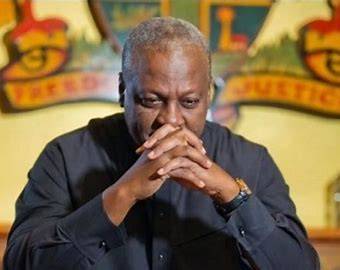JOHN DRAMANI MAHAMA ON THE FIGHT OF CORRUPTION.
Samuel Okudzeto Ablakwa, the Chairman of the Operation Recover All Loot (ORAL) team, has revealed that President-elect John Dramani Mahama is poised to make significant reforms to tackle corruption in Ghana. Central to these reforms is Mahama’s commitment to reducing presidential powers, a move aimed at fostering greater accountability and transparency in government.
In an interview on Joy FM on Thursday, December 18, 2024, Ablakwa emphasized that this bold decision demonstrates Mahama’s determination to prioritize national interests over personal authority. The President-elect’s willingness to relinquish some of his executive powers is a clear indication that he is serious about addressing corruption at its roots, Ablakwa stated. “This is not just rhetoric; it is a deliberate step to strengthen democratic institutions and ensure they function independently.
Mahama’s decision to limit presidential powers is part of a broader strategy to restore public confidence in governance and combat the systemic corruption that has plagued the country for years. The President-elect has reportedly pledged to work with Parliament, civil society organizations, and other stakeholders to pass reforms that will decentralize authority and empower oversight bodies.
One of the key areas Mahama intends to address is the excessive influence of the executive branch on anti-corruption institutions. Critics have long argued that the centralization of power within the presidency undermines the independence of bodies like the Auditor-General’s Office, the Special Prosecutor’s Office, and the Commission on Human Rights and Administrative Justice (CHRAJ). By reducing presidential control over these agencies, Mahama aims to create an environment where they can operate without fear or favor.
Ablakwa elaborated on some of the proposed measures, which include amending constitutional provisions that grant the President sweeping appointment powers. Currently, the President appoints heads of key institutions, which can lead to conflicts of interest and undue influence, Ablakwa explained. Under the new framework, these appointments will require bipartisan approval or be made by independent panels to ensure credibility.
Additionally, Mahama plans to advocate for stronger financial autonomy for oversight institutions. Many of these bodies have struggled with inadequate funding, which hampers their ability to carry out investigations and enforce accountability. By ensuring direct budgetary allocations from Parliament, Mahama hopes to eliminate the executive’s ability to starve such institutions of resources.
The reforms also extend to increasing transparency in public procurement and contract awards, areas often identified as hotspots for corruption. Ablakwa noted that Mahama’s administration intends to strengthen existing laws and introduce new mechanisms to prevent abuses. We want a system where every Ghanaian can track how public funds are spent and who is benefiting from government contracts, Ablakwa said.
Mahama’s stance has garnered praise from various quarters, with many seeing it as a progressive move toward deepening democracy and curbing corruption. However, some skeptics question whether these promises will translate into action. Ablakwa addressed these concerns, urging Ghanaians to hold the incoming administration accountable while expressing confidence in Mahama’s resolve.
The President-elect understands that the fight against corruption requires more than words, Ablakwa concluded. His willingness to reduce his own powers is a testament to his commitment to building a better Ghana for all.
As Mahama prepares to assume office, the nation watches closely, hopeful that these reforms will mark the beginning of a new era in governance. For many, the prospect of a presidency that prioritizes institutional integrity over personal authority is a welcome change, signaling a brighter future for Ghana’s democracy.



No comments yet
Be the first to share your thoughts!